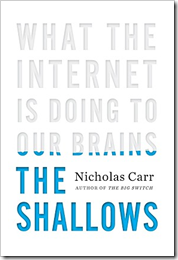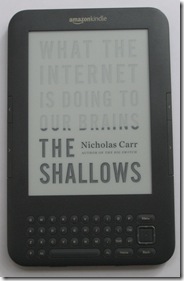 What is common between Michael Lewis, Malcolm Gladwell, Paul Graham , Clay Shirky ? If you have read any of the articles in the media written by the above authors, their articles are distinct. They are long, hyperlink free, engage our minds for a long period of time using arguments / interesting examples , make us a bit contemplative . In short we can DEEP READ their articles. They have the power to change our thought process too. However the other 99.9999999 % of the stuff that we come across on the net are basically short articles heavily laden with hyperlink , video links, multimedia etc. Exposure to such media is doing something to our brains and Nicholas Carr discusses the issue thread-bare in his new book , “ The Shallows”.
What is common between Michael Lewis, Malcolm Gladwell, Paul Graham , Clay Shirky ? If you have read any of the articles in the media written by the above authors, their articles are distinct. They are long, hyperlink free, engage our minds for a long period of time using arguments / interesting examples , make us a bit contemplative . In short we can DEEP READ their articles. They have the power to change our thought process too. However the other 99.9999999 % of the stuff that we come across on the net are basically short articles heavily laden with hyperlink , video links, multimedia etc. Exposure to such media is doing something to our brains and Nicholas Carr discusses the issue thread-bare in his new book , “ The Shallows”.
Medium is the message , goes the popular saying and Nicholas Carr argues that medium has greater impact than the content , on the way we think and act. The author begins his book by admitting that his capacity for concentration and contemplation has come down, after years of exposure to internet. He chose to ask around a few people , formally and informally , and found that this condition to be true for a large number of people. A wide range of people including, faculty from premier medical schools, students from various Ivy league colleges,corporate personnel increasing admit that they are in the same boat. They seemed to have lost the ability to read and absorb a longish article on the net. Some admit that they no longer read on the internet, they merely skim/ scroll. Few even go to the extent of justifying this change in the mindset by saying,”One no longer needs to read books, as the relevant content one is looking for is available as a blurb, short article, paragraphs in Google books, wiki pages , etc”. “Why waste reading a full length book when one can just skim a few articles / facts about whatever one is looking for ? “, goes the usual stance.
Basically for an increasing majority, net is rewiring their brains by making them think that the very idea of reading a book is old fashioned. There is absolutely no debate about the riches that internet can bring along. Its stupendous growth is a testimony for its utility. You can get to amazing amount of information with in a few clicks. However it looks like what we are trading away is “our old linear thought process” , Calm, focused, undistracted, the linear mind is being pushed aside by a new kind of mind that wants and needs to take in and dole out information in short, disjointed , often overlapping bursts- the faster the better! . Do we all realize it that net is rewiring our brains ? When we do a ton of things all at one go, check our email/gmail- allow the you tube video to load,-monitor the tweets-get notified of blog posts by RSS reader, what exactly is happening to our brains ? Most of us do seem to relate to the situation described above as we constantly multi-task on net. We might kid ourself and think that we are in control of the media. Are we truly in control ? Or is the Net that is controlling us ?
The book delves a bit in to the structure of brain. It traces the initial assumption of scientists and researchers who held a view that brain structure was akin to a single continuous fabric of nerve fibres which was kind of fully determined by DNA and the childhood experiences. The prevalent view was that structure develops early in a human’s life and there after it is pretty much fixed. Subsequent discovery of neurons, synapses, neuro-transmitters in the brain , and research shows that brain is massively plastic in nature. The space between neurons where the signals are transmitted changes constantly based on our life experiences, the way we think, the way we do things, etc. Umpteen number of examples are quoted in the book which drives home the point that mind is plastic but not elastic, meaning the mind does not snap back to the old structure after a while. It is constantly changing and massively elastic based on the way we think/do stuff. Ok, so if the brain is work in progress forever, can internet , which is basically a tool in our hands , change the entire structure of our brains ?
Yes says neuroplasticity research. The book traces out a bunch of tools starting from maps, clocks, ploughs, machines etc, and shows that in each case, the tool took us from the practical everyday usage to a situation where mind developed higher level of abstraction. Maps for example transformed experience in space to abstraction of space. Clocks which were just a tool to record the flow of time have had an unimaginable impact on our mind. We have managed to divide time in to greater precision , and have cut days in hours minutes and seconds, thus virtually changed the meaning of the word “time”. “I don’t have time for —- ” is a very common sentence you get to hear and if you pause and reflect on that statement, you are bound to realize that time controls us , a tool which we invented to control stuff. Same is the case with any tool which we start using. Internet is no different.
The book takes a stance that “The World of a screen is different from the World of a page”. Pages in the book can be deep read. Arguments , sometimes lengthy and winding can be read and pondered for a while. This is almost next to impossible while reading stuff on the screen . Do you remember any content that you have read for let’s say 1/2 – 1 hr hr on the net ? Unlikely. Why ? Because the medium itself is designed to give you short bursts of disjointed information. So, if you are constantly reading stuff ONLY online and not engaging yourself on deep reading, brain will get rewired soon and it is likely that your attention span is going to reduce in the activities not connected to net. That’s a little scary because true innovation comes from deep thought and something that robs deep thought is definitely not desirable.
The Very image of a book is changing. ebooks have hit the market which are being marketed at a deep discount price as compared to books/hard covers. The distribution of ebooks has also changed dramatically. Ipad, Kindle and other ebook readers, now enable us to get a book with in no time. But what is further dramatic is what we see on the screen. Inbuilt dictionaries, hyperlinked content, access to internet, blogs, magazines at now a click away. In the earlier times, if you had to disengage from a book, you had to atleast put the book away but now the distractions are built right in to the book!. So, will you be able to deep read a book ? Well, you can if you turn off the wireless and all the other distractions that come with ipad / kindle ? Economics will no doubt push the books to be published in ebook format, kindle format and the reading habits are bound to change. Infact I think we should welcome all these technologies but need to be AWARE that there are tons of distractions that the ebook readers come along with. Unless one turns off those distractions, you might not be able to read books in a silent and contemplative way.
Last week, my friend gifted me Kindle. It was a delightful surprise. The first thing I noticed that it had an awesome interface and easy access to tons of books and was extremely light. The moment I started reading I could not resist accessing kindle store, visiting hyperlinks in the book etc. However once I turned off the wireless and other distractions, Kindle was a charm. I could read for a long stretch of time with absolute ease. I think the new Kindle is going to be a game changer in the e-book reader business.
Another nice argument put forth in the book is that of memory. Research confirms that there are two types of memories, short term / working memory and long term memory. Long term memory usually comprises schemas, linkages , ideas and short term memory is like a scratch pad which gets rewritten quickly. However for something to go in to long term memory , it has to pass from the working memory. The problem with reading stuff on the net is that since it is disparate,hyperlink heavy , the information is tough to get in to long term memory. On the other hand , linear reading facilitates the passage between working and long term memory. Various experiments have shown that hyperlink , hypermedia text increases the cognitive load and most often times never gets to the long term memory. So, net by its very nature, distracts us. In other words, we get distracted from distraction by distraction.
An often quoted view is “ Why remember anything at all , if I can access stuff at the click of a button?”, The book gives a fitting reply to such a view by stating that
“We don’t constrain our mental powers when we store new long term memories. We strengthen them. With each expansion of our memory comes an enlargement of our intelligence. The web provides a convenient and compelling supplement to personal memory, but when we start using the web as a substitute for personal memory, by passing the inner process of consolidation, we risk emptying our minds of their riches”
The book draws upon various empirical and experimental research to prove that Net is subverting our capacity for concentration and contemplation , a by-product of linear reading. It does make one aware that conscious disengagement from the web is imperative in our daily lives.
In the choices we have made, consciously or not, about how to use computers and net, we have rejected the intellectual tradition of solitary, single-minded concentration, the ethic that the book bestowed on us. We have cast our lot with the juggler. Unless we consciously disengage from this medium for a few hours daily , we will become more distracted in our thoughts and actions.

March 29, 2015 at 6:53 pm
[…] have enjoyed reading Nicholas Carr’s previous book titled “The Shallows”, that discusses at length various ways in which Internet impacts our brain. In this book, the […]